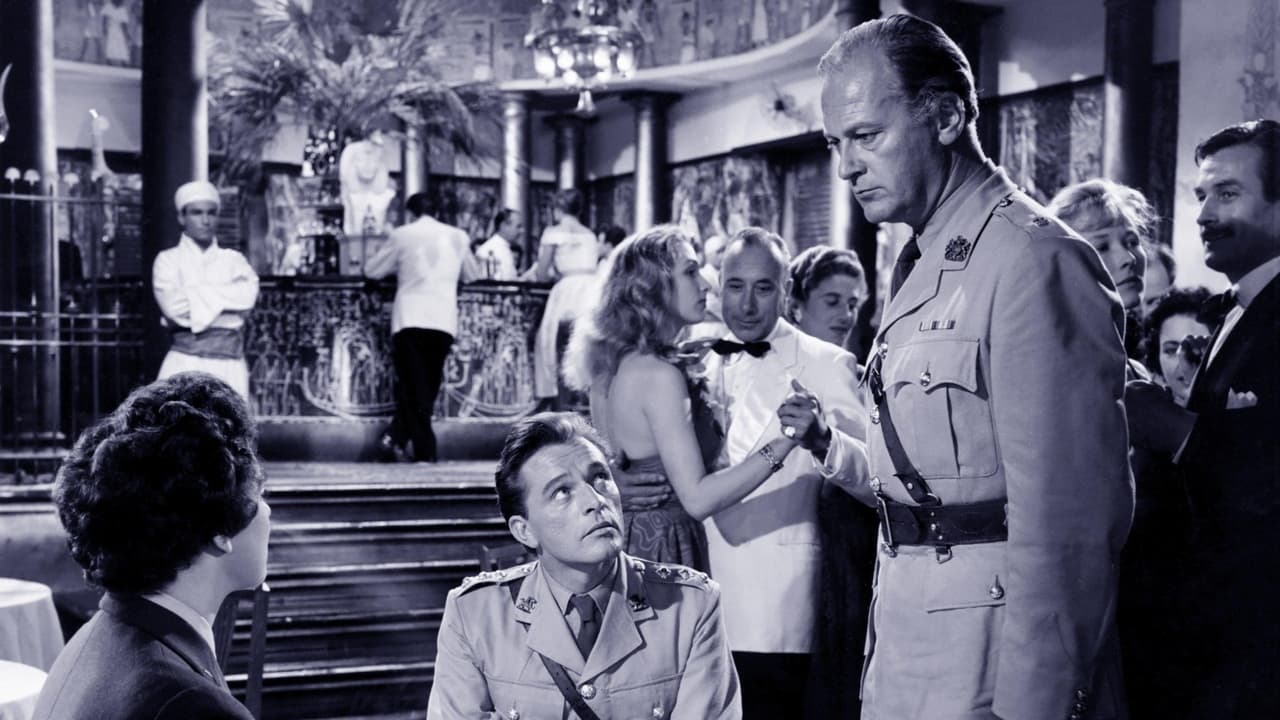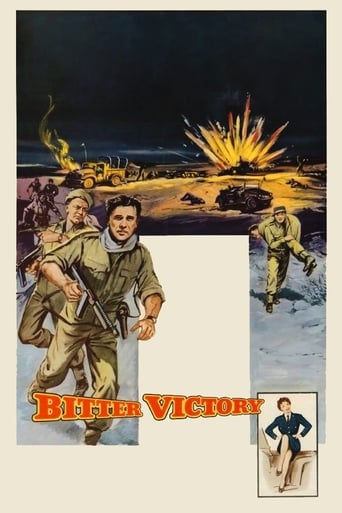

This film made a very odd casting decision. For some reason, the German actor Curt Jurgens was hired to play one of the leads...a British major serving in WWII! He doesn't sound the least bit British and this took me out of the film a bit. The other lead was Richard Burton....a man who grows to hate and have contempt for the major during the course of their suicide mission. This is because although the Major was in control of the mission, he is a coward and hesitates when they need to act. And, it appears that the Major might just be trying to get the Captain (Burton) killed off so that no one will know about his failings as a leader.An interesting portrait of humans in war, it's worth seeing but isn't a great war film. By the way, there was one scene that annoyed me. The Captain is bitten by a scorpion and INSTANTLY everyone thinks he will die. Death from scorpion stings is VERY rare and only about 2% of all scorpion species MIGHT be able to kill you...and mostly if your system is already compromised. And, just like snakebites, you DO NOT cut the wound to suck out the poison!!! Kids...don't try this at home!!!
... View MoreA "Lawrence of Arabia," this film isn't. In fact, it's far from that all though we have plenty of desert sand along the way.The film will absolutely overwhelm you with its boredom,despite the starring of Richard Burton and Kurt Jurgens.We have absolutely no idea until the very end why the men went on such a mission. The actual obtaining of the material was done with little excitement.The whole thing boils down to getting away in the desert and whether to kill the wounded on either side.This is rather a tedious film, co-starring Ruth Roman, married to Corporal Jurgens, but once involved with Burton. It doesn't take Jurgens long to realize what has transpired between the two.Ironically, what Burton did during the desert scenes, he avoids that happening to him via the sandstorm. "He killed the living, and saved the dead." That's a major line uttered by Burton in this film. This film could easily kill the viewers watching it.
... View MorePossibly Nicholas Ray's most masculine film, he begins with a great opening credits sequence and follows with a studious, procedural atmosphere. When it gets emotionally dramatic quite soon, it remains taut, spare, subdued. Because Ray doesn't tell us how to feel about it, our understanding of the histrionics is that much clearer and unclouded. By the twenty-minute mark, the tension is a natural agreement between us and the film, which sits back viewing objectively horizontal planes, or stationary horizontal shots of whatever natural blocking. Even a shootout in the desert night.Bitter Victory is a rare treat, a military thriller involving war and covert ops, but focusing not on combat or conspiracies, but on the agitated envy two Allied officers who are situated on a commando raid together. We skip the parachuting in to Bengasi but we're quickly witness to their wordless close calls and perceptions of un-subtitled Arabic. This downbeat emotional drama is what no Jack Ryan or Jason Bourne film would have the nerve or insight to do. It sees combat violence, sneak operations and life-or-death situations, of course, but it does not see the core of the suspense in it. But one of the two central characters, yes, essentially just two, is burying his knowledge that he's unfit for his job and undeserving of his command as deep as he can beneath the assurances of his aggressive justification. Another is having an affair with that very commander's wife, whose emotions are displaced from her husband.The on-screen violence is far from realistic, but building towards it and simmering down from it are steady and natural to the point that I might even say that it is Ray's most effective film about repression and male anger, even the great In a Lonely Place, in which Humphrey Bogart's outbursts betray an all-too-real recklessness in his eyes. The tension in Bitter Victory makes brief outbursts by, say, the latter said central character, played intensely by Richard Burton, feel twice the jolt of the violence which is expected of his mission. And the tensions heightened by the controlling anger of the commander, in a strong performance by Curt Jurgens, create a balance of ambiguity. We know the crushing inadequacies that haunt the very men we find so brutally cold.
... View MoreThankfully now available in its full 103-minute version, this is one of Nicholas Ray's strongest works and one of the handful that doesn't bear the marks of studio meddling. It's an unrelentingly grim tale of cowardice and lost love which is almost incidentally set during WWII. Richard Burton manages to deliver cutting, pointed dialogue without making it hammy, and Curt Jurgens' performance of a deceitful squad leader is extremely strong; a coiled spring which never quite releases.I can't help but wonder if some of the comments above are based upon the US version, which was cut by a whopping 21 minutes, because this is unquestionably one of the best of the Nick Ray canon. Working in many of his trademark themes of sacrifice and loss but keeping the melodrama surprisingly low-key, it's also gorgeously photographed in 'Scope black-and-white and none of the performances falter. Those who have enjoyed ATTACK, HELL IS FOR HEROES, THE BIG RED ONE and particularly Anthony Mann's brilliant MEN IN WAR are well advised to check this out, and it's a must-see for Ray enthusiasts, right up there with ON DANGEROUS GROUND, THE SAVAGE INNOCENTS, JOHNNY GUITAR and IN A LONELY PLACE.
... View More